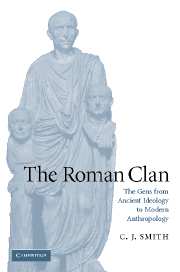Book contents
- Frontmatter
- Contents
- List of illustrations
- Preface
- List of abbreviations
- General introduction
- Part I THE EVIDENCE FOR THE GENS
- Chapter 1 The ancient evidence
- Chapter 2 Modern interpretations
- Chapter 3 The gens in the mirror: Roman gens and Attic genos
- Chapter 4 Archaeology and the gens
- Part I: Conclusion
- Part II TOWARDS AN INTERPRETATION OF THE GENS
- Appendix 1 Dionysius of Halicarnassus on the Roman curiae and religion
- Appendix 2 The missing curiae
- Select bibliography
- General index
- Index of ancient persons
- Index of passages discussed
Part I: Conclusion
Published online by Cambridge University Press: 22 September 2009
- Frontmatter
- Contents
- List of illustrations
- Preface
- List of abbreviations
- General introduction
- Part I THE EVIDENCE FOR THE GENS
- Chapter 1 The ancient evidence
- Chapter 2 Modern interpretations
- Chapter 3 The gens in the mirror: Roman gens and Attic genos
- Chapter 4 Archaeology and the gens
- Part I: Conclusion
- Part II TOWARDS AN INTERPRETATION OF THE GENS
- Appendix 1 Dionysius of Halicarnassus on the Roman curiae and religion
- Appendix 2 The missing curiae
- Select bibliography
- General index
- Index of ancient persons
- Index of passages discussed
Summary
In the first part of this volume we have looked at the gens from four different perspectives. We have considered the ancient evidence and found it to be complex and not straightforward. Although it was an institution which, as we have seen in chapter 2, has bulked large in modern accounts, the picture presented in the ancient sources is problematic, and the definitions we have are dated much later than the period for which the gens is usually invoked as a key institution. I have revived Radin's important observation on Livian usage, and tried to indicate that the reservations over the use of the word gens for non-patricians are not confined to Livy, without claiming that it was impossible for a plebeian family to be recognised as a gens, and indeed there were legal arguments that regarded the gens as an institution found beyond the patriciate. My central contention is that this uncertainty and doubt is a genuine product of the fact that the gens was a topic of debate in antiquity.
We have also looked at the way that the concept of the gens has been treated by modern scholars from the Renaissance, and we have identified some of the unfounded assumptions which have entered the discourse, and shown how these assumptions have affected discourse outside ancient history.
- Type
- Chapter
- Information
- The Roman ClanThe Gens from Ancient Ideology to Modern Anthropology, pp. 164 - 166Publisher: Cambridge University PressPrint publication year: 2006

